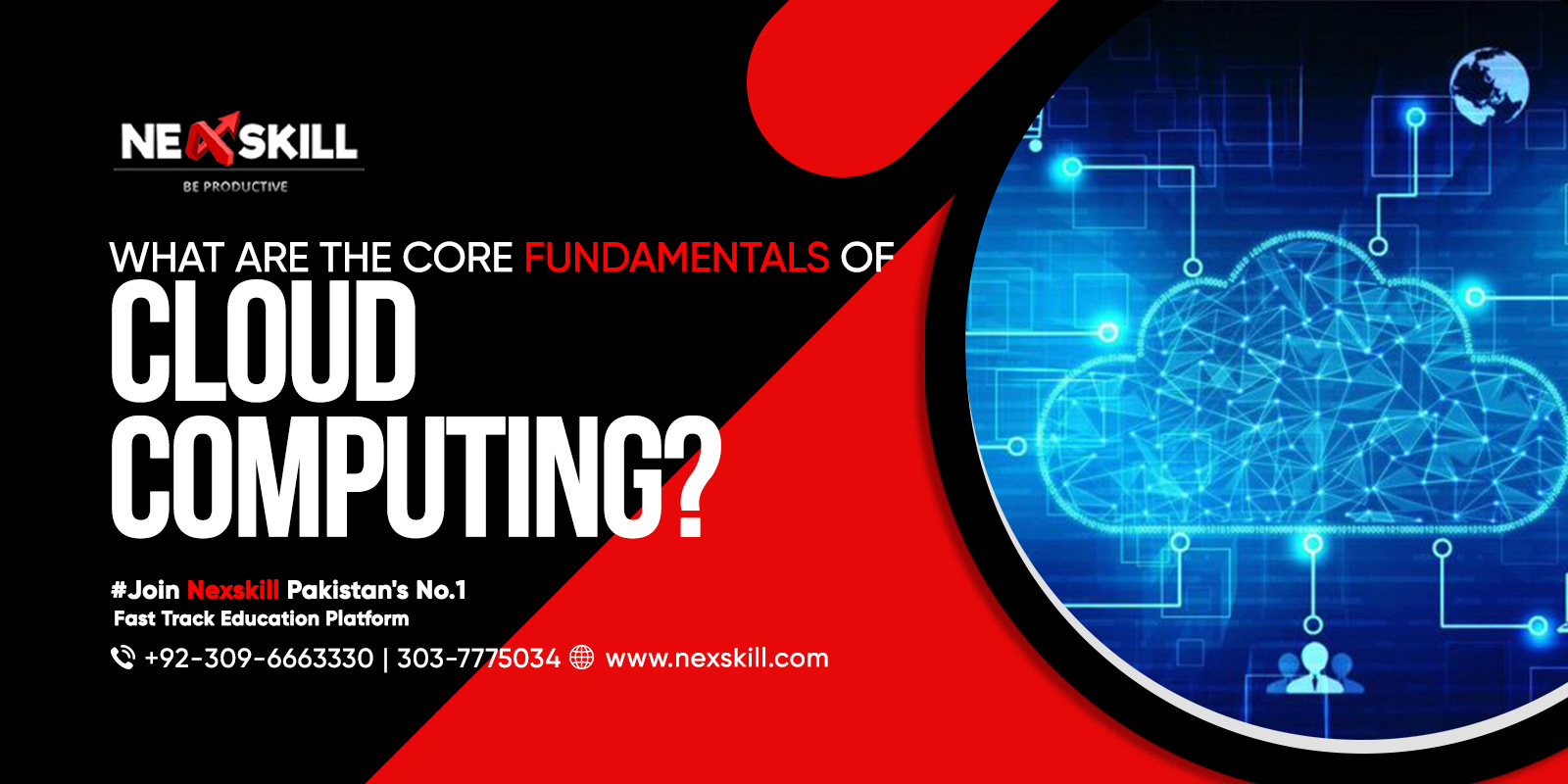
Cloud Computing has revolutionized the way businesses operate in the modern digital landscape. It offers scalable and flexible solutions for data storage, processing, and application deployment. In this blog, we will dive into the core fundamentals of cloud computing and how Nexskill’s “Be Productive” program can help individuals understand and utilize this transformative technology.
Understanding Cloud Computing:

Cloud computing refers to the delivery of on-demand computing resources over the internet. So it enables users to access a vast network of servers, storage, databases, and other services, allowing them to scale their infrastructure as needed. Here are the core fundamentals of cloud computing:
On-Demand Self-Service:
It provides users with the ability to provision and manage resources without human intervention. Users can access and configure the required resources on the fly, without the need for lengthy manual setup.
Broad Network Access:
It offers ubiquitous access to resources over the internet. So users can access their data and applications from any device or location with an internet connection, facilitating flexible and remote working environments.
Resource Pooling:
Cloud providers consolidate their resources to serve multiple users, creating shared pools of computing power, storage, and network bandwidth. So this allows for efficient resource allocation, maximizing the utilization of resources across multiple clients.
Rapid Elasticity:
It enables the rapid scaling of resources up or down based on demand. So users can easily increase or decrease computing power, storage capacity, and network bandwidth to meet fluctuating needs, ensuring optimal resource utilization and cost-effectiveness.
Measured Service:
Cloud providers offer a pay-per-use model, where users are billed based on the actual usage of resources. This allows for precise and transparent tracking of resource consumption, providing cost control and flexibility.
Benefits of Cloud Computing for Businesses:
Embracing cloud computing offers several benefits for businesses:
Cost Savings:
It eliminates the need for large upfront capital investments in hardware and infrastructure. Instead, businesses can leverage the pay-as-you-go model, reducing operational costs and increasing financial flexibility.
Scalability and Flexibility:
It allows businesses to scale their resources up or down based on demand. So this agility enables rapid response to changing business needs, ensuring optimal performance and resource utilization.
Disaster Recovery and Business Continuity:
Cloud providers offer built-in redundancy, backup, and disaster recovery solutions. So this safeguards businesses against data loss and enables quick recovery in the event of system failures or disasters.
Global Accessibility and Collaboration:
It eliminates geographical barriers, enabling seamless collaboration between teams spread across different locations. So it facilitates real-time access to data and applications, enhancing productivity and efficiency.
Nexskill – Be Productive Program of Cloud Computing Fundamentals:
Nexskill, a leading training institute, offers a comprehensive program called “Be Productive,” which includes a course in Cloud Computing Fundamentals. So this program is designed to provide individuals with a solid understanding of the core concepts, services, and benefits of it. Let’s explore what this program has to offer:
Introduction to Cloud Computing:
The course starts with an overview of it, explaining its key characteristics, deployment models (public, private, hybrid), and service models (IaaS, PaaS, SaaS).
Cloud Infrastructure:
Participants delve into the fundamental components of cloud infrastructure, including servers, storage, and virtualization. So they gain insights into how these components interconnect to provide scalable and resilient cloud solutions.
Cloud Service Providers:
The course offers an overview of popular cloud service providers such as Amazon Web Services (AWS), Microsoft Azure, and Google Cloud Platform. So students learn about the services and solutions offered by these providers and their respective advantages.
Cloud Security:
Security is a critical aspect of cloud computing. So this course covers the core security considerations in cloud environments, including data privacy, access controls, encryption, and compliance. Participants gain an understanding of best practices for securing cloud-based applications and data.
Cloud Storage and Data Management:
This section focuses on cloud-based storage services, such as Amazon S3 and Google Cloud Storage. Students learn how to store and manage data in the cloud, including data backup, replication, and versioning.
Cloud Networking:
Networking is a crucial aspect of cloud computing. Participants explore topics like virtual private networks (VPNs), load balancing, content delivery networks (CDNs), and network security in the cloud. So they gain insights into designing and implementing a robust and scalable cloud network architecture.
Conclusion:
It has become an integral part of the modern digital landscape. Understanding the core fundamentals of cloud computing is crucial for individuals aiming to leverage its benefits in their personal and professional endeavors. Nexskill – Be Productive program, specifically the Cloud Computing Fundamentals course, equips individuals with the knowledge and skills needed to navigate this evolving technology. Whether you are an aspiring IT professional, a developer, or a business owner, mastering cloud computing fundamentals through Nexskill’s training can open up a world of opportunities in the dynamic field of cloud computing. Embrace the power of the cloud and stay competitive in the fast-paced digital era.

